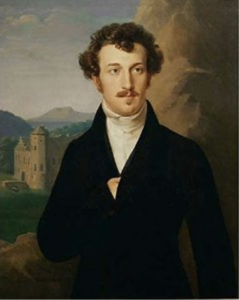Death music
(Poet's title: Todesmusik)
Set by Schubert:
D 758
[September 1822]
In des Todes Feierstunde,
Wenn ich einst von hinnen scheide,
Und den Kampf, den letzten, leide,
Senke, heilige Kamöne,
Noch einmal die stillen Lieder,
Noch einmal die reinen Töne
Auf die tiefe Abschiedswunde
Meines Busens heilend nieder.
Hebe aus den ird’schen Ringen
Die bedrängte, reine Seele,
Trage sie auf deinen Schwingen,
Dass sie sich dem Licht vermähle.
O da werden mich die Klänge
Süß und wonnevoll umwehen,
Und die Ketten, die ich sprenge,
Werden still und leicht vergehen.
Alles Große werd ich sehen,
Das im Leben mich beglückte,
Alles Schöne, das mir blühte,
Wird verherrlicht vor mir stehen.
Jeden Stern, der mir erglühte,
Der mit freundlichem Gefunkel
Durch das grauenvolle Dunkel
Meines kurzen Weges blickte,
Jede Blume, die ihn schmückte,
Werden mir die Töne bringen.
Und die schrecklichen Minuten,
Wo ich schmerzlich könnte bluten,
Werden mich mit Lust umklingen,
Und Verklärung werd ich sehen
Ausgegossen über allen Dingen.
So in Wonne werd ich untergehen,
Süß verschlungen von der Freude Fluten.
At the solemn hour of death
As I eventually depart from here,
And I suffer that battle, that final battle,
Sacred muse, lower
Once more those silent songs,
Once more those pure notes
Over the deep wounds of farewell
In my breast, lower them to heal me;
Out of this earthly fight, lift
This troubled pure soul,
Take it up on your wings:
So that it can be wedded to the light.
Oh, up there I will be surrounded by sounds
That are sweet and blissful,
And the chains which I am escaping
Will silently and gently disappear.
I shall see all that is great,
Everything that delighted me in life,
Everything that is beautiful that blossomed for me
Will stand in all its glory before me.
Each star which shone for me,
With its friendly sparks
Looking through the terrifying darkness
Down on my short path,
Each flower which adorned it
Will bring me colour;
And the awful minutes
When I could have been bleeding in agony
Will reverberate pleasantly around me;
And I shall see transfiguration
Poured out over everything.
I shall thus pass away in bliss,
Sweetly swallowed up in floods of joy.
All translations into English that appear on this website, unless otherwise stated, are by Malcolm Wren. You are free to use them on condition that you acknowledge Malcolm Wren as the translator and schubertsong.uk as the source. Unless otherwise stated, the comments and essays that appear after the texts and translations are by Malcolm Wren and are © Copyright.
☙
Themes and images in this text:
Chains and shackles Chest / breast Farewell and leave taking Fighting and wrestling Floods and tides Flowers Joy Light Muses Noise and silence Pain Paths Pouring, scattering and strewing Soothing and healing Songs (general) Soul Sounds Stars Sweetness Under the water, sinking and drowning War, battles and fighting Wings
The sacred muse being invoked here is one of the ‘camenae’: ‘Roman goddesses, identified since Livius Andronicus (Odissia, fr. 1) with the Muses. They seem, however, to have been water-deities . . . ‘ (The Oxford Classical Dictionary 2nd edition Oxford 1970 p. 198). This water connection may explain the final image of the text as the writer envisages death as drowning in floods of joy. We are perhaps not supposed to notice the contradiction between this image and the idea of being carried aloft on the muse’s wings and being wedded with light.
Or perhaps this is the very sort of obvious inconsistency that we are meant to take seriously, along with the strange idea of the muse lowering both ‘silent’ songs and pure notes over the dying poet’s wounds. Then there is the synaesthesia: the starlight and the flowers which the dying poet noticed whilst alive become transfigured as both colourful and tunefully reverberant (‘die Töne bringen’ seems to refer to a moment of ecstasy in which colour is actually heard). It is as if we are being forced to acknowledge the inadequacy of each individual image; we are being invited to understand that the experience of dying goes beyond words.
☙
Original Spelling Todesmusik In des Todes Feierstunde Wenn ich einst von hinnen scheide, Und den Kampf, den letzten, leide, Senke, heilige Kamöne, Noch einmal die stillen Lieder, Noch einmal die reinen Töne Auf die tiefe Abschiedswunde Meines Busens heilend nieder, Hebe aus den ird'schen Ringen Die bedrängte reine Seele, Trage sie auf deinen Schwingen: Daß sie sich dem Licht vermähle. - O da werden mich die Klänge Süß und wonnevoll umwehen, Und die Ketten, die ich sprenge, Werden still und leicht vergehen. Alles Große werd' ich sehen, Das im Leben mich beglückte, Alles Schöne, das mir blühte, Wird verherrlicht vor mir stehen. Jeden Stern, der mir erglühte, Der mit freundlichem Gefunkel Durch das grauenvolle Dunkel Meines kurzen Weges blickte, Jede Blume, die ihn schmückte, Werden mir die Töne bringen; Und die schrecklichen Minuten, Wo ich schmerzlich könnte bluten, Werden mich mit Lust umklingen; Und Verklärung werd' ich sehen Ausgegossen über allen Dingen. So in Wonne werd' ich untergehen, Süß verschlungen von der Freude Fluthen.
Confirmed by Peter Rastl with Gedichte von Franz von Schober. Stuttgart und Tübingen. J. G. Cotta’scher Verlag. 1842, pages 70-71; and with Gedichte von Franz von Schober. Zweite, vermehrte Auflage. Leipzig Verlagsbuchhandlung von J. J. Weber. 1865, pages 85-86.
Note: Schubert received all poems from Schober in handwritten form. A (possibly later) autograph of this poem is kept in the Vienna City Library.
To see an early edition of the text, go to page 70 [88 von 292] here: http://digital.onb.ac.at/OnbViewer/viewer.faces?doc=ABO_%2BZ20766660X


